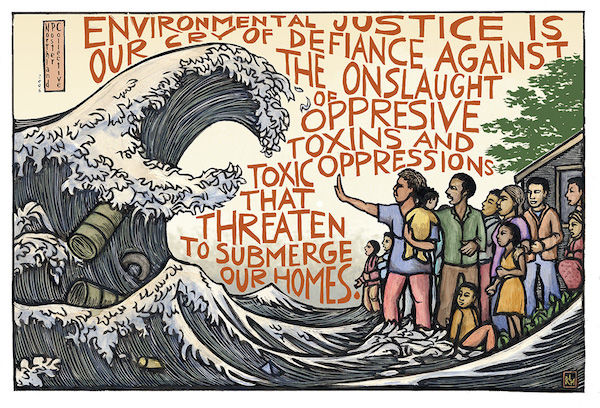Mystical Hope: Persistence in the Midst of Climate Change
Theological Intern Wyatt Robinson shares learnings from his time at Church and Society and the gift of mystical hope.

As my time as a Theological Intern with Church and Society comes to an end, I have been doing a lot of reflecting on the diverse, invaluable experiences I’ve had while advocating for our core issue of environmental justice.
In the Fall semester, I got to meet with the staff members of Church and Society and receive an orientation to the way that they each connect the theological tasks of the church to their daily work advocating for justice.
I was also given the opportunity to engage with Church and Society’s advocacy at COP26. Throughout the Winter and Spring, I was given the chance to manage several environmental justice projects. With the guidance of Deputy General Secretary John Hill, I was engaged in the revision process of the Faith and Facts cards on Sustainability, Environmental Justice, Clean Water, and Food Justice.
Perhaps the most rewarding experience of my time at Church and Society was the opportunity to conduct research and give testimony to the EPA, advocating for new emission standards for the control of air pollution from heavy-duty vehicles. During this experience, I was able to connect the impacts of these proposed policies to our United Methodist Social Principles and Resolutions and call on the EPA to recognize the positive impact that these policies could have on our climate as well as communities of color.
As I reflect on my experiences in their entirety, I feel a battered, yet a resilient sense of hope for the future of the environmental justice movement. “Hope” is a rare word to hear in conversations related to climate change, and it feels funny to say that I feel hopeful when considering the pervasive misinformation and continued resistance toward policies of environmental justice around the world.
Nonetheless, I feel a sense of what Cynthia Bourgeault calls “mystical hope” that abides in the midst of fear and frustration at the state of our climate. Bourgeault defines three core features of mystical hope that stands in contrast to our normal sense of hope:
1. Mystical hope is not tied to a good outcome, to the future. It lives a life of its own, seemingly without reference to external circumstances and conditions.
2. It has something to do with presence—not a future good outcome, but the immediate experience of being met, held in communion, by something intimately at hand.
3. It bears fruit within us at the psychological level in the sensations of strength, joy, and satisfaction: an “unbearable lightness of being.” But mysteriously, rather than deriving these gifts from outward expectations being met, it seems to produce them from within…
In my time working alongside Church and Society on issues of environmental justice, I have experienced “mystical hope” time and time again that surpasses my understanding of the current state of our climate as bleak. This mystical hope is rooted in the abiding presence of God in communion with us, as well as communion with United Methodists around the globe who persevere in the fight for a more just and sustainable future for our world.
May we continue to see and enjoy the fruits of “strength, joy, love, and satisfaction” that this mystical hope provides.
Wyatt Robinson was a theological intern for the fall of 2021 and Spring of 2022. His focus was on environmental justice and climate justice.